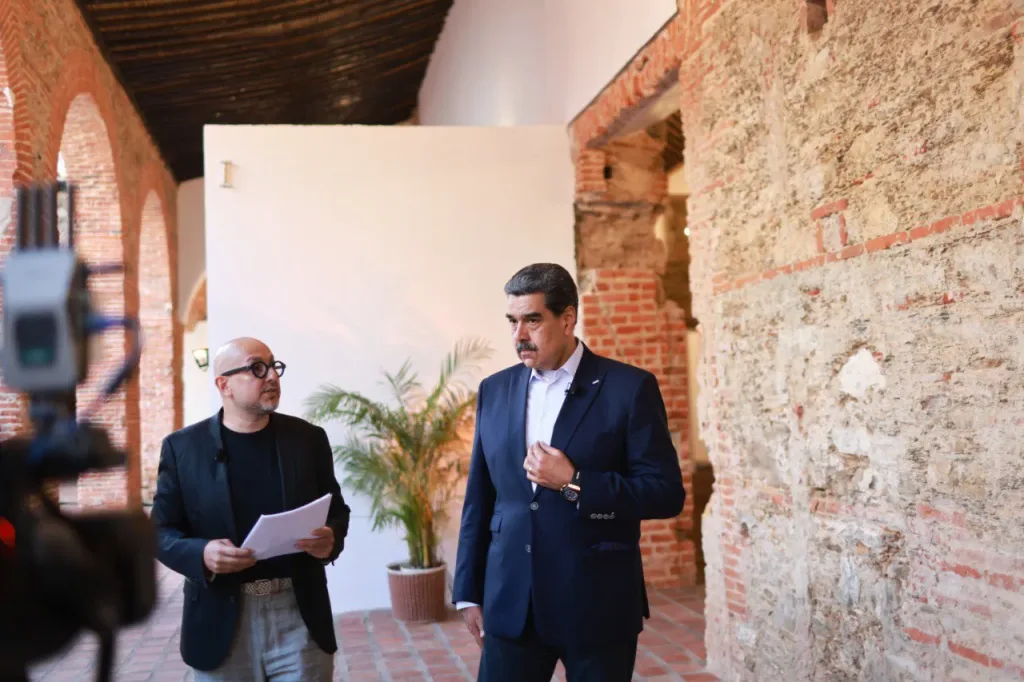
Nicolás Maduro, president of Venezuela, with Miguel Ángel Pérez Pirela, Venezuelan journalist during the program Con Maduro+ on October 27, 2025. Photo: Venezuela's Presidential Press.

Orinoco Tribune – News and opinion pieces about Venezuela and beyond
From Venezuela and made by Venezuelan Chavistas

Nicolás Maduro, president of Venezuela, with Miguel Ángel Pérez Pirela, Venezuelan journalist during the program Con Maduro+ on October 27, 2025. Photo: Venezuela's Presidential Press.
Caracas (OrinocoTribune.com)—Venezuelan President Nicolás Maduro announced Monday night that he accepted the recommendation of the publicly owned petroleum company PDVSA to suspend the energy cooperation agreement signed with Trinidad and Tobago in 2015 and involving Venezuela’s Dragon gas field.
During the program Con Maduro+, the president informed the public of the decision, noting that the he was forced by the actions of Kamla Persad-Bissessar, Trinidad and Tobago prime minister, to take the decision. President Maduro noted that he was advised by the Council of State, the Supreme Court, and the National Assembly to evaluate how to proceed with the agreement and its projects.
“In the face of the prime minister’s threat to turn Trinidad and Tobago into an aircraft carrier for the US empire against Venezuela, there is only one alternative: I have approved the precautionary measure of immediate suspension of all effects of the energy agreement and all agreements made in that regard,” President Maduro said.
The development of the key Dragon gas field project has been affected by the arrival of Donald Trump to the US presidency. Trump revoked all previous US OFAC licenses related to Venezuela. However, on Oct. 8, Trinidad celebrated the fact that it received a special US OFAC license issued by the Trump regime.
Trinidad and Tobago’s own gas reserves were exhausted several years ago, and the agreement meant significant revenue for that country, which is toiling under myriad economic problems.
View this post on Instagram
A post shared by Medio de Comunicación | Canal de TV | Venezuela (@pdvsa_tv)
President Maduro’s comment about further actions might hint, according to analysts, at a plan to pursue the Dragon project with other international partners, perhaps from China, Russia, or west Asia.
PDVSA proposal
The suspension follows a proposal from Vice President Delcy Rodríguez to suspend all energy and gas cooperation agreements with Trinidad and Tobago.
Rodríguez reported that the leadership of the Venezuelan Oil Ministry and PDVSA proposed to President Nicolás Maduro “the immediate denunciation of the framework agreement for energy cooperation” signed between the two countries in 2015.
“This directive, both from the ministry and its operator, PDVSA, has decided to propose to President Nicolás Maduro the immediate termination of the Macro Energy Cooperation Agreement between the Republic of Trinidad and Tobago and the Bolivarian Republic of Venezuela, which was signed in 2015 for a 10-year term and automatically renewed in February of this year for an additional five years,” she said, citing Article 3, Paragraph 3 of the document to carry out this procedure.
The vice president stated that the decision was taken in response to the prime minister of Trinidad and Tobago’s decision to “follow the United States’ war-mongering agenda to attack” Venezuela, a reveral of the strong historical ties between the two Carribean nations.
Rodríguez recalled that Kamla Persad-Bissessar’s first words upon taking office were “to declare war on Venezuela,” which came as a surprise. The prime minister has launched a xenophobic campaign against Venezuelan migrants using a “Trinidad First” slogan that resembles the “America First” rhetoric used by Trump’s MAGA base.
“Then, the prime minister, in a hostile and aggressive attitude toward Venezuela, joined a warlike plan by the United States government, because it must be emphasized, she has believed the stories sold to her by Marco Rubio, that he can steal gas from Venezuelans and give it to Trinidad and Tobago,” she said.
VP Rodríguez explained that the agreement is broad, covering energy cooperation, the management of joint gas fields, infrastructure development, the execution of hydrocarbon projects, and the monetization of joint resources, among other issues.
The proposal followed reports of a false-flag operation which, according to the Venezuelan government, was confessed to by a group of individuals linked to the US Central Intelligence Agency and which sought to attack US facilities or equipment. Subsequently, attempts would be carried out to blame Venezuela and use it as a casus belli to ignite a US military aggression within the framework of recently launched joint US–Trinidad military drills.
“It is not tensions [between Venezuela and the US]. It’s a US aggression, a militaristic aggression against Venezuela,” said VP Rodríguez. “It is about oil and gas,” emphasizing that this US threat puts peace in the Caribbean and Latin American region at risk.
Venezuela Denounces US-Backed Military Drills by Trinidad and Tobago as Hostile Provocation
PSUV Statements
The secretary general of the United Socialist Party of Venezuela (PSUV), Diosdado Cabello, supported PDVSA’s proposal and, on Monday, repudiated the joint military exercises being held between the US and Trinidad and Tobago, held off the Venezuelan coast, as a clear “provocation” amid the escalating attacks against Caracas.
During the weekly PSUV press conference, Cabello questioned Washington and Port of Spain’s decision to hold the military drill “right off the Venezuelan coast” despite the availability of other areas in Trinidadian territory and despite the death of two Trinidadian citizens already killed by recent US military extrajudicial executions in the region.
Cabello pointed out that these drills are the latest step in a campaign of “maximum pressure” and lies designed to create a pretext for military aggression against Venezuela. The Chavista leader noted that the White House has lost credibility, citing the collapse of narratives such as the defunct “Tren de Aragua” and the “Cartel of the Suns,” and he compared this strategy to the dissemination of lies about alleged weapons of mass destruction in Iraq to justify a war that cost millions of lives.
Special for Orinoco Tribune by staff
OT/JRE/SL